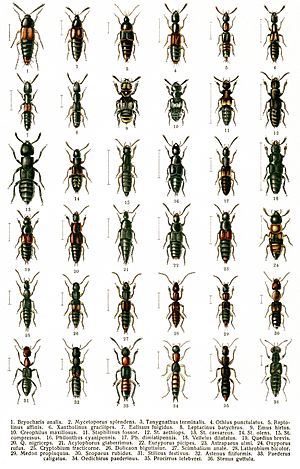Rove beetle facts for kids
Quick facts for kids Rove beetles |
|
|---|---|
 |
|
| Rove beetles of western Eurasia | |
| Scientific classification | |
| Kingdom: | |
| Phylum: | |
| Class: | |
| Order: | |
| Suborder: | |
| Infraorder: |
Staphyliniformia
|
| Superfamily: |
Staphylinoidea
|
| Family: |
Staphylinidae
Lameere, 1900
|
Rove beetles are a huge group of beetles! Their scientific name is Staphylinidae. They are actually the largest family of beetles in the world. There are more than 63,000 different kinds of rove beetles known today.
These beetles have been around for a very long time. Scientists have found fossils of rove beetles that are 200 million years old! That means they lived during the Triassic period, when dinosaurs roamed the Earth.
You can usually spot a rove beetle by its short elytra. These are the hard wing covers that protect a beetle's wings. For rove beetles, these covers are much shorter than on most other beetles. They only cover about half of the beetle's abdomen (its back part).
What do rove beetles look like?
Since there are so many types of rove beetles, they come in many shapes and sizes. Most are between 2 to 8 millimeters long, which is about the size of a grain of rice. However, some can be tiny, less than 1 millimeter, while others can grow up to 35 millimeters (about 1.4 inches) long!
Most rove beetles have a long, thin body shape. But some are more oval-shaped. Their colors can be very different too. You might see them in yellow, red, brown, black, or even shiny blue and green.
Rove beetle antennae and body parts
Rove beetles usually have 11 segments on their antennae. These antennae are typically thin and thread-like. Some types have antennae that are slightly thicker at the end, like a small club.
Their abdomen (the back part of their body) can be very long and flexible. Because of this, some rove beetles might look a bit like earwigs. However, earwigs have pincers at the end of their bodies, which rove beetles do not.
See also
 In Spanish: Estafilínidos para niños
In Spanish: Estafilínidos para niños
 | Kyle Baker |
 | Joseph Yoakum |
 | Laura Wheeler Waring |
 | Henry Ossawa Tanner |

